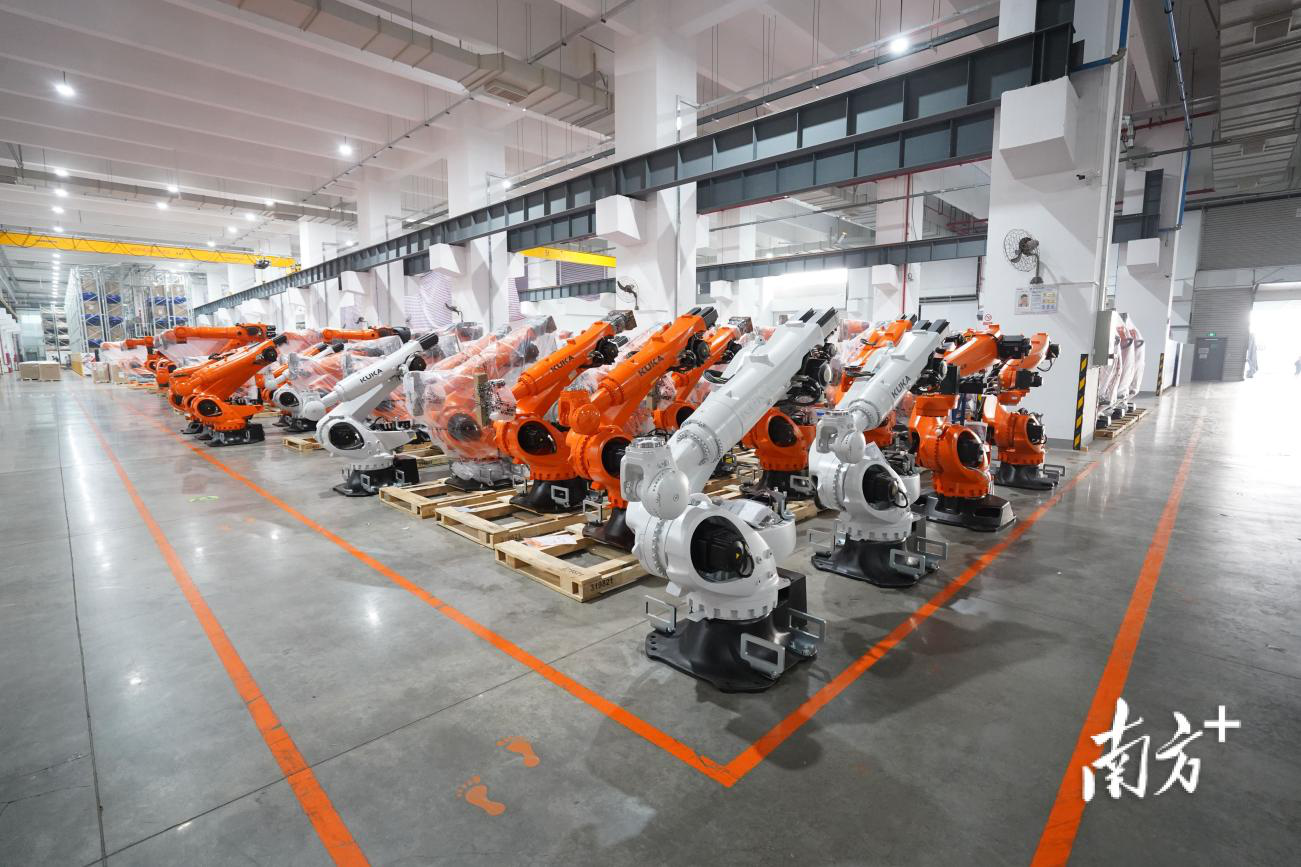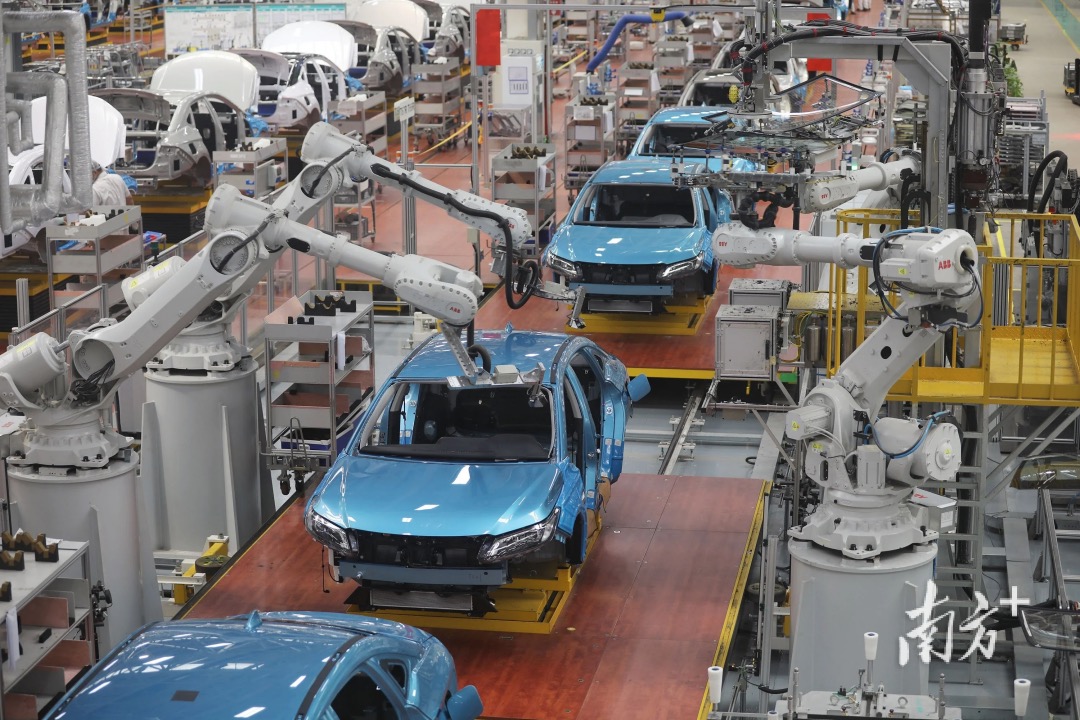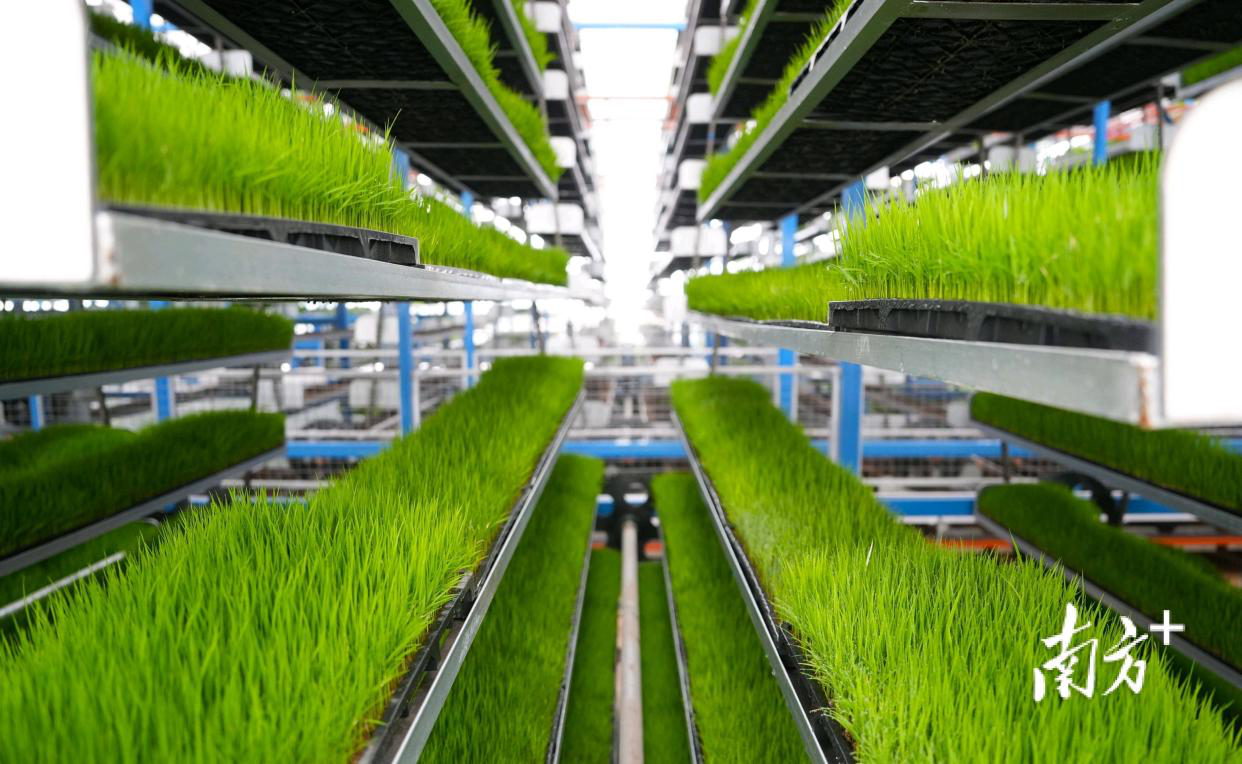As China's leading province in terms of economy, manufacturing, and technological innovation, Guangdong has successfully established a strategic industrial cluster development framework comprising nine clusters at the trillion-yuan level, two clusters at the 500-billion-yuan level, seven clusters at the 100-billion-yuan level, and two clusters at the ten-billion-yuan level. The added value generated by these 20 strategic industrial clusters accounts for nearly 40% of the provincial GDP, playing a pivotal role in seizing industry development opportunities.
What underpins these clusters is Guangdong's robust innovation ecosystem
The province is home to approximately 77,000 high-tech enterprises, and its regional innovation capacity has ranked first nationwide for eight consecutive years.
The contribution of advanced manufacturing and high-tech manufacturing to the total industrial output of above-scale enterprises has increased to 56.7% and 31.6%, respectively.
In 2024 alone, Guangdong accounted for one-quarter of the national output of NEVs, 44% of industrial robot production, over 40% of smartphone manufacturing, and 18% of ICs production.
Guangdong hosts over 150 full-time academicians from the Chinese Academy of Sciences (CAS) and the Chinese Academy of Engineering (CAE), brings together more than 5,000 high-level professionals from both domestic and international sources, and employs over 1.35 million R&D personnel.

A robust industrial system
Guangdong is advancing new industrialization at an accelerated pace. A robust industrial system, featuring a comprehensive range of categories and well-established supporting facilities, has been largely established. In 2024, above-scale industrial enterprises in the province generated operating revenue of RMB19.4 trillion. The province boasts all 31 major manufacturing categories, with 15 industries—including electronic information manufacturing, automobiles, and electrical machinery—leading the nation in scale.
The strategic industrial cluster development framework in Guangdong has now taken shape. Among these, the nine industrial clusters at the trillion-yuan level encompass the new generation of electronic information, modern light industry and textiles, advanced materials, green petrochemicals, modern agriculture and food, smart home appliances, software and information services, automobiles, and new energy. The two clusters at the 500-billion-yuan level to the trillion-yuan level include ultra-high-definition video display and digital creativity. Additionally, there are seven clusters at the 100-billion-yuan level to 500-billion-yuan level including high-end equipment manufacturing, as well as two ten-billion-yuan clusters including intelligent robots, blockchain, and quantum information.

Nine industrial clusters at the trillion-yuan level
New generation electronic information industry cluster
Guangdong has emerged as China's largest production and manufacturing hub for electronic information products and one of the world's most significant electronic information industry clusters. Leveraging the development of the Guangdong-Hong Kong-Macao Greater Bay Area, the province is reinforcing its high-end electronic information industry belt along the east bank of the Pearl River while promoting coordinated development across the eastern and western wings of the coastal economic belt and the northern ecological development zone.
Green petrochemical industry cluster
The Green petrochemical industry is one of the key pillar industries in Guangdong. It is capital-intensive, technology-driven, and talent-oriented, with strong industrial interconnectivity and an extensive industrial chain. This industry plays a crucial role in the province's industrial economic system. Leveraging the coastal petrochemical industry belt, Guangdong is actively developing a distinctive industrial layout featuring "one belt, two wings, five bases, and multiple parks operating in synergy".
Intelligent home appliance industry cluster
As the world's largest home appliance manufacturing hub, Guangdong's home appliance industry has achieved over ten national firsts, including the emergence of enterprises with annual revenues exceeding RMB 100 billion, Fortune Global 500 companies, listed firms, a substantial number of valid invention patents, and production volumes of air conditioners, electric cookers, microwave ovens, and color TVs. The industry accounts for nearly 30% of the global home appliance market share and over 40% of China's home appliance industry output. Midea, Gree, Galanz, TCL, and others stand as exemplary representatives of "Home Appliances Made in Guangdong".
Advanced materials industry cluster
In Guangdong, advanced materials industries—such as building materials, green steel, non-ferrous metals, chemical materials, and rare earth materials—are demonstrating trends toward large-scale operations, green development, high-end positioning, and intelligent manufacturing. To date, advanced materials industrial bases have been preliminarily established in cities such as Guangzhou, Shenzhen, Zhuhai, Foshan, Shaoguan, Heyuan, Meizhou, Huizhou, Dongguan, Zhongshan, Yangjiang, Zhanjiang, Maoming, Zhaoqing, Qingyuan, and Yunfu.
Modern light industry and textile cluster
With Guangzhou, Shenzhen, and Foshan serving as the key drivers of industrial development, and with close collaboration from cities such as Dongguan, Zhongshan, Huizhou, and Chaozhou, Guangdong has established a highly dynamic and competitive modern light industry and textile cluster.
Software and information service industry cluster
Industry leaders including Huawei, ZTE, Tencent, and NetEase have established robust operations in Guangdong. Meanwhile, local enterprises such as Kingdee and Sangfor have rapidly emerged and are flourishing. By 2024, software business revenue had successfully exceeded RMB2 trillion, achieving the cluster's short-term development goals ahead of schedule.

Modern agriculture and food industry cluster
Guangdong is not only a leading manufacturing province but also a major agricultural and food production hub. Despite accounting for only 1.9% of the nation's arable land, Guangdong has achieved approximately of the national total agricultural output value and 6% of the national agricultural added value.
Automobile industry cluster
As China's top province in automobile production, Guangdong has established a diversified automotive industry structure. In 2024, Guangdong's automobile production surpassed 5.7 million units, maintaining its position as the top-ranked province in the country for eight consecutive years. Notably, the production of NEVs reached 3.61 million units, with a year-on-year increase of 43%. The Guangzhou-Shenzhen-Foshan-Huizhou-Dongguan-Zhongshan new energy intelligent connected vehicles (new energy ICVs) cluster has been recognized as one of the advanced manufacturing clusters in China. Additionally, Guangzhou and Shenzhen have been selected as pilot cities for the national "vehicle-road-cloud integration" application in ICVs.
New energy industry cluster
In recent years, the scale of the new energy industry in Guangdong has kept expanding. In the province, wind power, solar power, and biomass energy have achieved large-scale application. The installed capacity of nuclear power and natural gas storage capacity rank among the highest nationwide. Its offshore wind power has entered a phase of rapid development.
In 2024, the new energy industry cluster in Guangdong generated operating revenue of RMB 1,116.318 billion, making it the 9th industrial cluster at the trillion-yuan level in the province.
Source | 2025 Invest Guangdong
Photo | Nanfang Plus






